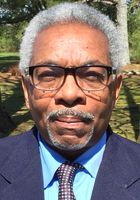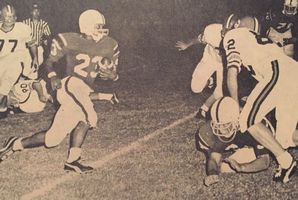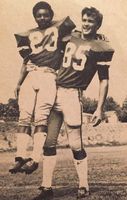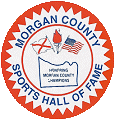2018 INDUCTEE - BOBBY JOE PRIDE
By David Elwell
The Decatur Daily
 Bobby Joe Pride knew he made the right decision when he saw a headline in The Decatur Daily in the fall of 1967 that called him "The Pride of Decatur."
Bobby Joe Pride knew he made the right decision when he saw a headline in The Decatur Daily in the fall of 1967 that called him "The Pride of Decatur."
He felt his move from football star at Decatur's Lakeside High to football star at Decatur High was complete.
"When I left Lakeside to go play at Decatur, I was looking for a better opportunity," Pride said. "I wanted to see if I was good enough to have a chance to play college football. I didn't see many players leaving Lakeside to go play in college."
The speedy Pride became a star in his one season as a Red Raider. He followed that with a strong career at Florence State University. His name is still in the record book at what is now the University of North Alabama.
"When I was a freshman at Lakeside, I was 5-foot-3, 135 pounds and I started at middle linebacker," Pride said. "By my sophomore year I was 5-8, 150 and they moved me to running back and defensive back."
That's when the legend of Bobby Joe Pride took off. Pride scored 15 touchdowns as a sophomore. He topped that with 20 touchdowns his junior season.
"I kept hearing people say 'but that's at Lakeside. You can't do that at Decatur,'" Pride said. "I wanted a chance to show them I could."
Pride got his chance in 1967.
The U.S. Supreme Court ruled in Brown vs. Board of Education in 1954 that separate but equal was unconstitutional. That had little effect on schools in the South. Decatur High remained white. Lakeside High remained black. When Austin opened in 1962, Decatur had two white high schools.
In 1966, black students were given the freedom of choice. Since most black students in Decatur lived closer to Lakeside and had to walk to school, most continued to go to school there. A few that lived closer to Decatur High did enroll there.
Earl Webb became the Decatur head football coach in the summer of 1967. He faced a major rebuilding job. The program had gone through three lean years since H.L. "Shorty" Ogle had retired. The opening of Austin shifted a lot of the city's football talent to the new school. The Red Raiders went 0-10 in 1966.
Webb invited players from Lakeside to make the move to Decatur. Several took up the offer and started summer workouts. One was Fredrick Outlaw, who wanted to be a running back, but knew that was impossible at Lakeside.
 "I thought I could be a running back like (college and NFL great) Jim Brown," Outlaw said, "but I couldn't at Lakeside because of Bobby Joe Pride. I knew my best chance was to play at Decatur."
"I thought I could be a running back like (college and NFL great) Jim Brown," Outlaw said, "but I couldn't at Lakeside because of Bobby Joe Pride. I knew my best chance was to play at Decatur."
When Pride showed up at Decatur, Outlaw became an end and helped block for his friend.
Pride didn't show up at Decatur until the first day of school. He was one of three blacks in the senior class. The afternoon of the first day of school, Pride joined the football team.
"I don't think Coach Webb knew what to think," Pride said. "The first thing they had me do was go through some blocking drills."
Pride didn't start the season opener vs. Bradshaw, but he entered the game in the first quarter. His touchdown put Decatur up 7-0. The game ended in a 20-20 tie. It wasn't a win, but it did snap Decatur's 14-game losing streak.
"I remember the next week we watched film of the game," Pride said. "It was the first time I ever saw myself play football. They didn't film our games at Lakeside. From what I saw, I think I proved to Coach Webb that I could play football."
Decatur's next three games were against three big rivals. With Pride's explosive running ability leading the way, Decatur raced through Athens, 25-6; Austin, 33-0; and Hartselle, 39-7. Suddenly a program that had gone winless in almost two seasons was one of the hottest in North Alabama.
"I remember the crowd at the Austin game," Pride said. "It was so big we could hardly get out of the locker room and onto the field. They were lined up all the way around the fence around the field."
It was not just the fans that were interested in seeing the resurrected Decatur football program. College scouts were checking out No. 23 for the Red Raiders.
"Our next game was against Butler and I found out later from Coach Webb that Alabama has sent some coaches to watch me play," Pride said.
The Alabama coaches didn't get to see much of Pride. Early in the game, he was knocked out cold with a hit to the head. Pride said he returned to the game, but doesn't remember anything from the 28-0 loss.
Pride never heard from Alabama, which would not play its first black player until four years later.
Injuries took a toll on Decatur starting with the game with Butler. The result was four more losses. Decatur did finish the season with a 33-0 romp over Walker for a 4-5-1 record. That was still a big improvement over the 0-10 mark from the previous season.
"I really enjoyed going to Decatur," Pride said. "Everybody was good to me. I never had any problem with teammates or other students. On Friday nights, you could hear some comments from the stands, but there was never anything big that happened on the field."
When it came time to decide on a college, the Decatur connection to Florence hooked up Pride with the Lions. Florence's head coach was Hal Self, who had been a star quarterback at Decatur and later at Alabama.
 "Going to school at Florence was a lot like going to Decatur," Pride said. "There were 10 black students in the school my freshman year. Three of us played football. One was a majorette and one was in the band."
"Going to school at Florence was a lot like going to Decatur," Pride said. "There were 10 black students in the school my freshman year. Three of us played football. One was a majorette and one was in the band."
Pride made an impact in his freshman season in 1968 when he returned a kickoff 67 yards for a touchdown vs. Jacksonville State. His best season was in 1970 when he had 1,106 all-purpose yards. That included a 100-yard kickoff vs. Tennessee-Martin.
"They played me at running back, wide receiver and defensive back," Pride said. "It was like they could never decide where to play me."
Pride finished his career at Florence with 3,655 all-purpose yards and seven touchdowns.
